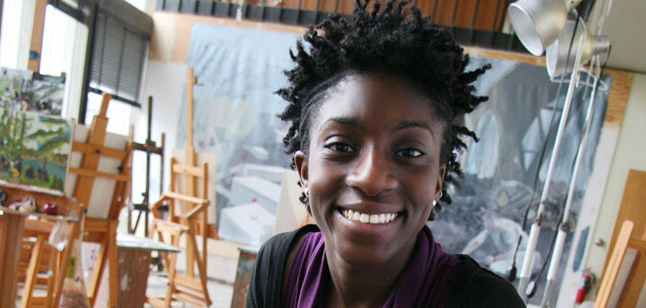About

The Department of American Studies at Macalester College serves as the academic focal point for the study of race and ethnicity in a national and transnational frame. The department provides an interdisciplinary approach to the study of racial categories and racialized experiences in the United States by encouraging close and systematic examination of a wide range of cultural and political narratives, and by creating structured opportunities to apply theoretical concepts in concrete settings of civic engagement.
As the field of American Studies has evolved in the last fifty years, it has shifted from an emphasis on American exceptionalism to consider broad questions of nation, national identity, and difference. American Studies embraces a range of methodologies to consider such complex issues as how we define borders, who is a citizen, and how movements for social change have shaped society. At the start of the 21st century, the president of the American Studies Association, Michael Frisch, underscored the centrality of multiculturalism to the field. “The third axis [of American Studies] is the transformative exploration of multiculturalism, ethnicity, race, class, and gender that has been recasting for several decades now the most basic outlines of American history and culture as a contested, interactive field of forces. It almost goes without saying, but not quite, that this has not simply altered our understanding of things “within” American culture and society, but has been leveraging our capacity to re-imagine the connections of the U.S. and its peoples to everything and everyone else in the world. . .”
Our emphasis is on race as a central dimension of U.S. social, political, cultural and economic life. This reflects an understanding that the prevailing concepts of citizenship, community, freedom and individuality in the United States contain within them deep fissures, erasures, and conflicts that depend upon particular constructions of race and racial difference. To move “past race” at this historical moment would be to ignore these conflicts and, in effect, to defuse ongoing struggles for social justice. In stressing the continuing significance of race, we take our cues from the rich and generative scholarship in African American Studies, Asian American Studies, Chicano/Latino Studies, Native American and Indigenous Studies, Women’s and Gender Studies, Queer Studies, critical race theory, cultural studies, and transnational, postcolonial and diaspora studies.
Introductory and intermediate courses in American Studies offer structured explorations of the histories and cultures of specific U.S. racial groups as well as opportunities to develop broad, comparative frameworks with which to analyze those specific histories and cultures. Our civic engagement component, required in the junior year, creates a place to engage with real-world complexities of racial difference, racial inequality, and racial justice whether local or global. Our senior capstone course integrates theory and practice, and prepares students for advanced study in American Studies or related areas.
Students who take courses in the Department of American Studies will gain an appreciation for the significance of race in their own lives and in the general world around them. Informed and active citizenship requires a careful understanding of how and why racial difference and racial inequality persist despite claims that we now live in a post-racial society in which color-blindness prevails. Students who minor in American Studies will gain a fundamental background in the range of racialized experiences in the United States and of the ways in which those experiences have been transformed over time.
We expect our majors will be able to:
- Articulate some of the many ways in which racial categories and racialized experiences shape U.S. social life;
- Identify and work with different conceptual and theoretical approaches to the study of race and ethnicity, including historical, sociological, and cultural perspectives;
- Demonstrate proficiency with a range of research tools;
- Perform as knowledgeable interlocutors in settings of civic engagement; and
- Display excellence in all aspects of academic life.
For more information about the academic field, please visit the American Studies Association’s website to browse over their latest newsletter.
For information about Macalester College’s Explorations of Race and Racism project, a national study of how minorities in urban areas were systematically locked out of homeownership, please visit the The Color of Law: Opportunity Indexing in American Studies website.
 Our web site features an oil painting entitled “The Flag is Bleeding” by Faith Ringgold.
Our web site features an oil painting entitled “The Flag is Bleeding” by Faith Ringgold.
Ringgold (1930-2024) was born in Harlem, New York. She received her B.S. and M.A. in Fine Arts from the City College of New York. Today, she is best known for her painted story quilts, which combine story telling and quilt making with genre painting. Ringgold’s children’s book, TAR BEACH, was a Caldecott Honor Book and won the Coretta Scott King Award for Illustration.
Ringgold used her art to voice her opinions on racism and gender inequality. In 1967, she created a series of paintings, “The American People,” that focused on racial conflict and discrimination. “The Flag is Bleeding,” number 18 in the series, depicts an African American man standing next to a white couple. Although the three seem united, the African American man’s wound indicates otherwise.
The significance of this work is partly about who is represented in the flag and also about who is missing. Who do you think is missing, and what do you think Ringgold is trying to say about America?